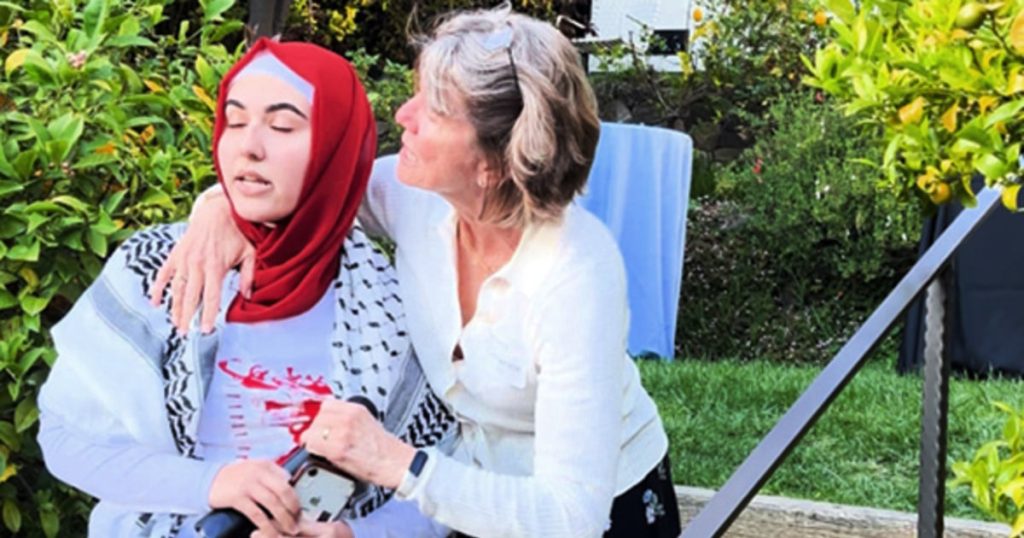The University of California, Berkeley has launched a Title IX civil rights investigation into a law professor, Catherine Fisk, for allegedly harassing a Muslim student, Malak Afaneh, during a dinner at Fisk’s home. The incident occurred on April 9, when Afaneh attempted to deliver a pro-Palestinian speech at the invitation-only dinner. According to the investigation, Fisk physically grabbed Afaneh, tried to take her cell phone and microphone, and asked her to leave when she began speaking about Palestine and Ramadan. Video footage showed Fisk trying to wrestle the microphone from Afaneh’s hands before eventually releasing her grip. Afaneh, a leading organizer of the university’s anti-war encampment, accused Fisk of silencing her due to her pro-Palestinian beliefs, labeling it as Islamophobia.
Fisk did not provide a comment on the incident, and the university declined to comment, stating it was a personnel matter. Fisk’s husband, Erwin Chemerinsky, who is the dean of the university’s law school and Jewish, called the disruption “ugly and divisive.” He expressed sadness over students being rude and using a social occasion for their political agenda. The clash between Fisk and Afaneh has raised concerns about free speech, Islamophobia, and antisemitism on college campuses, especially amid protests against the war in Gaza. Afaneh’s allegations have added to the ongoing debate on respecting diverse perspectives and the right to express political beliefs, even in private settings.
The incident at Fisk’s home has sparked a broader discussion on the limits of free speech, particularly in academic and private settings. The clash highlights the challenges faced by students and faculty in navigating sensitive topics such as religion, politics, and international conflicts. It also raises questions about the role of universities in fostering a diverse and inclusive environment while upholding principles of free speech and academic freedom. The investigation by the university’s Office for the Prevention of Harassment and Discrimination will likely shed light on the details of the incident and determine if any policies or regulations were violated.
The videos of the confrontation between Fisk and Afaneh have circulated widely, attracting national attention and generating debate on social media and news outlets. The varying interpretations of the incident, including accusations of Islamophobia, antisemitism, and censorship, have further fueled the controversy. The clash has deepened divisions among students, faculty, and community members, highlighting the complexities of addressing contentious issues in a university setting. The outcome of the investigation and any subsequent actions taken by the university will likely have far-reaching implications for campus culture, academic freedom, and the treatment of marginalized voices.
The clash between Fisk and Afaneh has underscored the importance of creating spaces for open dialogue, respectful disagreement, and constructive engagement with diverse viewpoints. The incident has prompted calls for greater awareness and sensitivity to the experiences of marginalized communities, including Muslim and Palestinian students. It has also raised broader questions about the responsibilities of educators and administrators in upholding principles of inclusion, equity, and mutual respect. Moving forward, the university may need to reassess its policies and practices to ensure the protection of students’ rights and the promotion of a welcoming and inclusive campus environment.
The incident at UC Berkeley serves as a critical reminder of the challenges and complexities inherent in addressing issues of discrimination, harassment, and free speech on college campuses. The clash between Fisk and Afaneh has highlighted the need for ongoing dialogue, education, and engagement to promote understanding, empathy, and solidarity across diverse communities. The outcome of the investigation will likely be closely monitored and scrutinized by stakeholders inside and outside the university, shaping future debates and actions on issues of social justice, academic freedom, and campus climate. Ultimately, the incident reflects broader societal tensions and divisions that universities must navigate with care, compassion, and a commitment to upholding core values of equity and justice.













